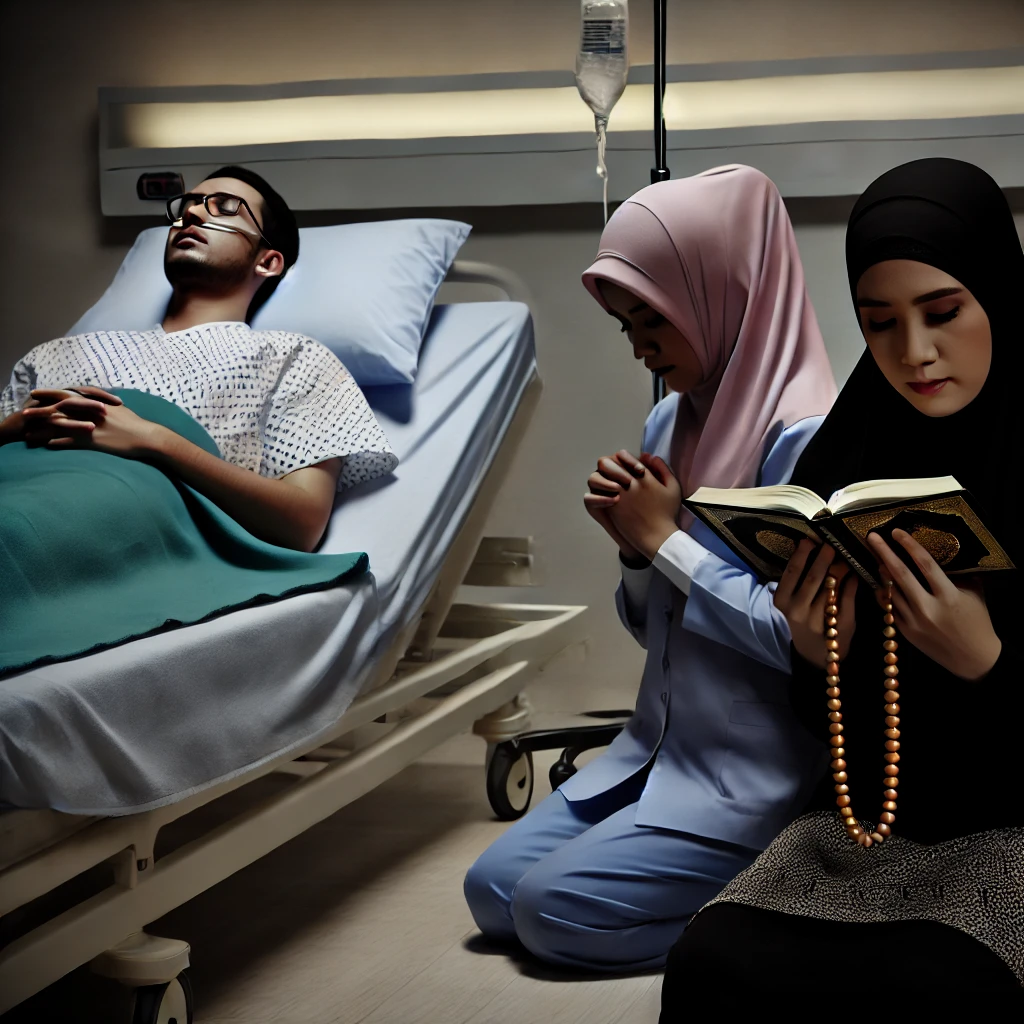Visiting The Sick (Opposite Gender)

Question:
I am a Muslim woman who strives to follow the commands of Allah in every aspect of my life, including my relationships with others. I work as a principal at an all-girls’ high school, where I interact with both male and female teachers. We exchange courtesies on various occasions, such as congratulating someone on a wedding, a new child, or a promotion. However, one issue that has raised concern for us is the question of visiting sick male colleagues. There are instances when a male colleague may fall ill or undergo surgery and be admitted to the hospital. Is it permissible for me and my fellow female teachers to visit our male colleague, considering the right of collegiality, or is this a matter that pertains only to men?
A similar question arises regarding male colleagues visiting a female colleague who becomes ill or is involved in an accident. Both men and women are exposed to such situations.
We request clarification on this matter in light of the established texts, which serve as the binding and infallible reference for all Muslims.
Answer:
All praise is due to Allah, and may peace and blessings be upon the Messenger of Allah, his family, his companions, and all those who follow his guidance.
Among the noble etiquettes that Islam has prescribed and that the noble Messenger ﷺ encouraged is the practice of visiting the sick. The Prophet ﷺ regarded it as one of the rights a Muslim has over another Muslim.
The Prophet ﷺ said, “The rights of a Muslim over another Muslim are six.” It was asked, “What are they, O Messenger of Allah?” He replied, “When you meet him, greet him with peace; when he invites you, accept the invitation; when he seeks your advice, give him sincere advice; when he sneezes and praises Allah, respond with a prayer for mercy upon him; when he falls ill, visit him; and when he dies, follow his funeral” (Narrated by Muslim).
Additionally, the Prophet ﷺ said, “Free the captives, respond to the invitation, feed the hungry, and visit the sick” (Narrated by Al-Bukhari).
He also said, “Visit the sick and follow the funeral processions; for they remind you of the Hereafter” (Narrated by Ibn Majah).
Furthermore, the Prophet ﷺ said, “Whoever visits a sick person, a caller from the heavens announces: ‘You have done well, and your path is blessed, and you have secured a place in Paradise’” (Narrated by At-Tirmidhi).
When a Muslim visits his fellow Muslim, he remains in the “Khurfah” of Paradise until he returns. It was asked, “O Messenger of Allah, what is the ‘Khurfah’ of Paradise?” He replied, “Its fruit,” meaning what is plucked and gathered from its trees.
Allah, exalted is He, will say on the Day of Judgment, “O son of Adam, I was ill, and you did not visit Me.” The person will say, “O Lord, how can I visit You when You are the Lord of the worlds?” Allah will reply, “Did you not know that My servant so-and-so was ill, and you did not visit him? Did you not know that if you had visited him, you would have found Me with him?”
One cannot find a more eloquent or profound portrayal of the virtue of visiting the sick and its reward from Allah than this. Allah, in His Majesty, likens visiting the sick to visiting Him.
All of these hadiths demonstrate the importance of this Islamic etiquette, which the Prophetic Sunnah, both in word and deed, has emphasized. The Prophet ﷺ even visited a sick Jewish man and invited him to Islam, and the man accepted.
The recommendation of this etiquette—described in some hadiths as a right of a Muslim over another Muslim—becomes even more emphasized when there is a strong bond between the Muslim and the person being visited, such as kinship, marriage, neighborhood, collegiality, or mentorship, which gives some individuals a more significant right than others.
It is also notable that these hadiths use general language that includes both men and women. The hadith, “Visit the sick,” or “Whoever visits a sick person,” or “When he falls ill, visit him,” are not restricted to men alone, without any debate. These general proofs apply to both genders equally.
The general address of these hadiths is sufficient to establish the permissibility of women visiting sick men, as long as the visit is conducted within the established Islamic guidelines and ethical boundaries.
Furthermore, there are specific proofs that demonstrate the permissibility of women visiting sick men. Imam Al-Bukhari mentioned in the chapter on visiting the sick in his Sahih, “The chapter of women visiting sick men.” He narrated that Umm al-Darda’ visited a man from the Ansar who used to frequent the mosque.
It was also narrated by Aisha that when the Messenger of Allah ﷺ arrived in Madinah, Abu Bakr and Bilal became ill. She said, “I entered upon them and asked, ‘O father, how are you feeling?’ and ‘O Bilal, how are you feeling?’”
The phrase “how do you find yourself?” means, “How are you feeling?” which we would express today as, “How is your health?”
Moreover, Umm Mubashir bint Al-Bara’ bin Ma’rur Al-Ansariyyah visited Ka’b bin Malik Al-Ansari when he was nearing death and said, “O Abu Abd al-Rahman, convey my greetings to my son,” referring to Mubashir.
Therefore, there is no objection to a Muslim woman visiting her sick Muslim brother as long as she adheres to the Islamic guidelines and proper etiquette, such as avoiding seclusion, not displaying adornment, avoiding the use of perfume, and not speaking in a soft or alluring tone.
It is preferable, in the case at hand, that the visit to the sick male colleague be conducted in a group. This means that the principal, along with some female teachers, should agree to go together to fulfill the duty of visiting, thus avoiding any suspicion.
There is no reason to hesitate in visiting a sick male colleague, especially when this female colleague or superior interacts with him daily at school without issue. Is it reasonable to interact with colleagues when they are healthy but to refrain when they are ill, despite the fact that the sick are more deserving of compassion and care?
As for a man visiting a sick woman, this is included in the general evidence that encourages visiting the sick.
There are also specific proofs that support the permissibility of men visiting sick women:
Both Al-Bukhari and Muslim narrated from Aisha that the Messenger of Allah ﷺ entered upon Dubaa’ah bint Al-Zubayr and said to her, “Perhaps you intended to perform Hajj?” She replied, “By Allah, I am only feeling ill.” He said to her, “Perform Hajj and set a condition” (i.e., in case her illness prevented her from completing it).
Muslim also narrated from Jabir bin Abdullah that the Messenger of Allah ﷺ visited Umm Al-Sa’ib—or Umm Al-Musayyib—and said to her, “What is wrong with you, Umm Al-Sa’ib, that you are trembling?” She said, “It is the fever, may Allah not bless it!” He replied, “Do not curse the fever, for it removes the sins of the children of Adam as a furnace removes the impurities of iron.”
Abu Dawood narrated from Umm Al-Ala that the Messenger of Allah ﷺ visited her while she was ill and said, “Rejoice, O Umm Al-Ala!”
Al-Nasa’i narrated from Abu Umamah that a woman from the ’Awali area of Madinah became ill. The Prophet ﷺ was exemplary in visiting the sick, and he said, “If she passes away, inform me.”
Al-Bukhari narrated that Ibn Abbas sought permission to visit Aisha during her illness that led to her death, and she granted him permission. He asked, “How are you feeling?” She replied, “I am well if I remain conscious of Allah!” He said, “Then you are well, God willing. You are the wife of the Messenger of Allah ﷺ, and he married no virgin other than you, and your innocence was revealed from the heavens.”
After these sound and explicit narrations, no Muslim should follow anything other than the guidance of Allah, exalted is He, and the example of His Messenger ﷺ. We should not restrict what Allah has made expansive, nor should we complicate what Allah and the Sunnah of His Messenger ﷺ have made easy.
May Allah grant success.
Dr. Yusuf al-Qaradawi
